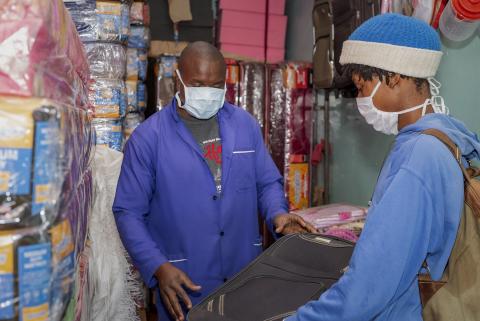
There is an urgent need for the United States to do more on the international stage to address COVID-19. Here’s what Congress can do.
Take Action: Tell Congress to provide life-saving foreign assistance for COVID-19
Watch our video message to Congress
The House of Representatives passed the HEROES Act, a $3 trillion federal COVID-19 emergency stimulus bill, on May 15. While it includes federal aid for many vulnerable communities in the United States, the package does not include any funding for international assistance.
International humanitarian experts at Bread for the World and elsewhere have urged Congress to provide $12 billion in aid for countries sinking under the weight of the coronavirus crisis. Reports from UN-affiliated agencies indicate that 265 million people could face starvation of “biblical proportions" by the end of the year and half-a-billion people could be pushed into poverty by the growing global economic crisis. Many impoverished countries are facing this new crisis compounded by ongoing crises of food insecurity, fragile health infrastructure, and crushing debt.
Congress has so far spent 0.1 percent—not one percent, but one-tenth of one percent—of its total COVID-19 response on international actions, roughly $2.4 billion out of $2.4 trillion. The $12 billion that many hoped would be included in the HEROES Act would be a step toward the nearly $90 billion in aid that UN experts predict will be needed to protect the most vulnerable 10 percent of people around the world.
As the United States faces an escalating health crisis at home, we cannot afford to ignore the situation among our neighbors beyond our borders. The spread of COVID-19 in developing countries will hamper the United States’ efforts to contain the pathogen domestically, impede global and domestic economic recovery, and intensify the political instability and human suffering that have contributed to high levels of migration in recent years.
To avoid dire economic and humanitarian consequences, Congress should take three actions.
Provide emergency assistance
Congress should provide no less than $12 billion for international assistance in the next legislative package. This funding should include resources for emergency global health and health security activities, as well as for food security, livelihood, and other programs to mitigate the economic shock of the pandemic. In comparison, the U.S. provided an emergency appropriation of $5.4 billion for three countries in West Africa to respond to the Ebola outbreak in 2015.
Within this response, Congress should continue support to the World Health Organization, the only multilateral institution organization with the technical capacity and global mandate to support and coordinate the public health response of all countries.
Support a moratorium on debt service payments
Congress should support expanding a moratorium on debt service payments from indebted countries to international financial institutions to enable countries to increase spending on essential items to fight the pandemic. So far, the IMF canceled debt payments for the 25 poorest countries and the G20 agreed to put debt on hold for others. But this is not enough. Across 46 countries, debt payments for this year are currently projected to be 400 percent of their health budgets.
Support the IMF issuance of Special Drawing Rights
Congress should instruct the U.S. representative to the International Monetary Fund (IMF) to support, not block, issuance of $3 trillion in Special Drawing Rights (SDRs), an emergency financial liquid resource that is without any cost to U.S. taxpayers. To be clear, it costs absolutely nothing to the U.S. taxpayer for the IMF to issue SDRs.
A special international reserve asset created by the IMF, SDRs are distributed to central banks of countries in proportion to their IMF quotas. Countries can exchange SDRs for freely usable currencies when they are in weak financial positions. They are similar to the Federal Reserve’s swap arrangements, which have primarily benefited wealthy nations, whereas SDRs are distributed to all IMF member countries. The IMF last issued SDRs in 2009 in response to the global financial crisis and thereby helped ease the impact of the crisis on developing economies.
Because SDRs are issued to each country roughly in proportion to the size of its economy, economists project that an issuance of $3 trillion SDRs will ensure that significant help can reach Latin America, sub-Saharan Africa and other regions that face major economic and public health emergencies.
So far in the House and Senate
In the House, the Robust International Response to Pandemic Act (H.R.6581), introduced by Representatives Jesus "Chuy" García, Jan Schakowsky, Mark Takano, and 13 other original co-sponsors needs to be part of forthcoming coronavirus legislation to ensure that developing countries will be supported by the International Monetary Fund (IMF) and other international financial institutions with the resources they need to confront this unprecedented global crisis.
In the Senate, the COVID-19 International Response and Recovery Act, introduced by a group of Senate Democrats led by Sen. Bob Menendez includes funding for FY2021 but not the emergency supplemental appropriations needed immediately.
According to a poll released by the U.S. Global Leadership Coalition, people in the United States overwhelmingly support increased foreign assistance due to the pandemic, with 80 percent of poll respondents agreeing that assistance to other countries to fight diseases makes us safer. Now U.S. voters need to tell Congress.
Photo: World Bank / Sambrian Mbaabu on Flickr
